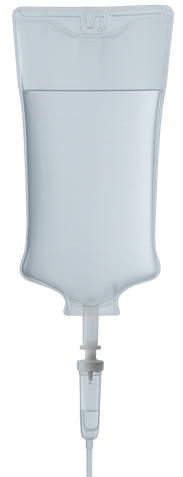How to deal with nutritional deficiencies & food cravings while expecting.
Lori Welstead, RD, never expected to receive a diagnosis of celiac disease in November 2015. As a registered dietitian at the University of Chicago Celiac Disease Center, Welstead had routinely counseled patients about how to eat healthfully while avoiding gluten.She’d been tested for celiac disease a year and a half earlier with negative results. The idea that she would ever develop the disease that dominated her working hours seemed farfetched.
However, Welstead wasn’t feeling her best that autumn. She suffered from fatigue and anxiety and she had gastrointestinal issues that she thought might be irritable bowel syndrome. Her vitamin B12 levels were a little low and she was slightly anemic. Most concerning, she’d had two miscarriages and was now having trouble conceiving at all.
So when the center’s yearly celiac screening was offered, she decided to take advantage of the opportunity. A few weeks later, she got a call from Stefano Guandalini, MD, the founder and director of the celiac center, now professor emeritus. He told her that her blood work was positive for celiac disease.
Welstead reeled from the news. But after the diagnosis was confirmed by biopsy, it didn’t take her long to practice what she preached to her patients and commit to a new way of living. Within a year of going gluten-free, she was able to get pregnant.
That prompted another challenge: being pregnant with celiac disease. New to the gluten-free diet, Welstead was concerned about her nutritional status and how it would affect her developing baby. Now that Saltines were off limits, she had to figure out gluten-free foods to ease her queasy stomach. And she had to find substitutes to quell her pregnancy cravings.
Fertility & Pregnancy
There’s ample scientific evidence that untreated celiac disease, characterized by inflammation and nutrient deficiencies, can lead to infertility. There can be issues during pregnancy, too. If a woman with untreated celiac does conceive, the fetus potentially could be at risk: An Italian study published in 2010 demonstrated that anti-transglutaminase (anti-tTG) antibodies in the blood—a hallmark of untreated celiac disease—can interfere with the function of the placenta, possibly leading to early loss of the pregnancy.
The key word is untreated. Once a woman with celiac disease starts eating gluten-free, getting and staying pregnant often become much easier.
“A number of pregnancy-related problems, such as miscarriages, premature birth and low birth weight, have been reported in celiac disease. Fortunately, these risks tend to be restricted to undiagnosed (and therefore untreated) celiac disease,” says Benjamin Lebwohl, MD, MS, director of clinical research at the Celiac Disease Center at Columbia University in New York. “After the diagnosis, these risks largely revert to the same as the general population.” Lebwohl and his team conducted a study examining pregnancy outcomes in women with diagnosed celiac disease whose follow-up biopsies showed intestinal healing. These results were compared with women whose follow-up biopsies revealed continued villous atrophy.
“We found that there was no difference in birth outcomes,” he says. “Overall, the rate of problems related to childbirth was low in both groups, since these were all mothers whose celiac disease was already diagnosed” and they were living gluten-free.
Eating Gluten-Free for Two
Because it can take time for the small intestine to heal on a gluten-free diet, newly diagnosed women who are pregnant or are trying to become pregnant face special nutritional challenges.

©GETTY IMAGES PLUS/ISTOCK/FOTOSTORM
“Ideally, before trying to get pregnant, women should wait for their celiac serology or blood work to normalize, which typically takes around six months,” says Cheryl Harris, MPH, RD, a dietitian in Fairfax, Virginia, who works with celiac clients.
Newly diagnosed women may be deficient in iron, folate, vitamin B12, vitamin D, zinc, copper and magnesium.
“Each of these nutrients are critical for growing a healthy baby,” Harris says. “Additionally, most wheat-based processed starches have a nutritional safety net built in. Breads and cereals are enriched with a range of B vitamins, iron and calcium. Gluten-free foods are generally not enriched, so anyone on a gluten-free diet may be more prone to nutrient deficiencies.”
Anemia can also be an issue. Pregnant women are generally at risk of being anemic and having untreated celiac disease adds to that risk. About half of newly diagnosed celiac patients are anemic, Harris says.
To boost a pregnant woman’s nutritional status, Harris and other experts recommend their patients limit eating processed gluten-free substitutes and instead choose foods that are naturally gluten-free—vegetables, fruits, nuts, seeds, beans, poultry, fish (varieties that are high in omega 3 and low in mercury, such as wild salmon and trout) and whole grains, such as quinoa, teff, buckwheat and brown and black rice.
“Aim for three or more cups of veggies a day, two or more cups of fruit, as well as nuts and seeds as snacks and gluten-free whole grains,” Harris advises. For added nutrition, she suggests rotating in more salads, adding chia or flax seed to yogurt and eating gluten-free oatmeal, if tolerated.
Welstead relied on just this kind of diet during her pregnancy. “During the summer, I would always have things like sliced cucumber because it was crunchy,” she says. “I would do chia pudding with coconut milk or another nut milk. Yogurt is another great choice to get your protein and calcium and it’s a probiotic.”
She also recommends gluten-free protein bars, popcorn and nut butters, particularly travel-friendly individual packets that can be squeezed onto a banana or apple slices for a quick eat-anywhere snack. “Or eat the peanut butter by itself for some good fats and proteins,” she says.
A gluten-free prenatal vitamin is important, too. Welstead suggests looking for one that’s not only labeled gluten-free but also verified by USP for meeting product quality standards. She also suggests an omega-3 DHA supplement, which she says can benefit the brain health of the fetus.
Welstead, who gave birth to a healthy baby girl in 2017, says the key to feeling satisfied on the gluten-free diet during her pregnancy was planning ahead. She cooked meals in advance and always had safe snacks at the ready when cravings struck.
“Some days were harder than others with cravings,” she says. “But I was able to find safe swap-outs.”
Her diligence paid off: She kept to the diet and her pregnancy went well.
“Remember that the gluten-free diet is the ‘medication’ for celiac disease,” Welstead says. “Take it one day at a time and stick with a strict gluten-free diet for a safe and successful pregnancy.”
Health and medical writer Laurie Saloman, MS, is the parent of a young adult with
celiac disease.






